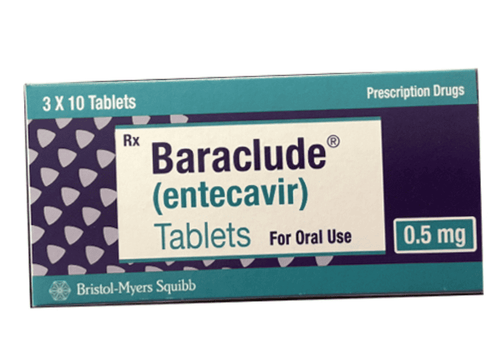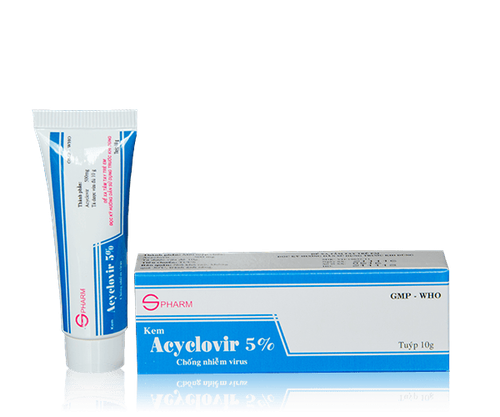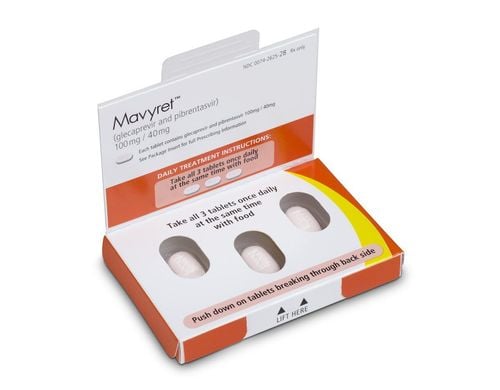This is an automatically translated article.
Madotevir 300 contains active ingredient Tenofovir Disoproxil Fumarat 300mg is indicated in the treatment of chronic hepatitis B in adults with evidence of viral replication and compensated liver disease... Notes when using Madotevir 300 through the article below.
1. Uses of Madotevir 300
"What does Madotevir 300 do?". Madotevir 300 is a film-coated tablet containing 300mg of Tenofovir disoproxil fumarate.
Tenofovir disoproxil fumarate belongs to the group of oral antiviral drugs that are structurally similar to Adenosine Monophosphate. After oral administration, Tenofovir disoproxil fumarate is hydrolyzed to Tenofovir and subjected to a Phosphorylation reaction by cellular enzymes to convert it to Tenofovir Diphosphate. The drug works by blocking the activity of HIV-1 reverse transcriptase and HBV polymerase through competition with the substrate present in the virus Deoxyadenosin 5' - triphosphate. Tenofovir diphosphate is active against mainly mammalian DNA-polymerase α, β and DNA polymerase enzyme.
Madotevir 300 is indicated in the following cases:
Treatment of chronic hepatitis B virus (HBV infection) in adults with evidence of viral replication and compensated liver disease; Prevention of HIV infection.
2. Dosage of the drug Madotevir 300
Madotevir 300 is taken orally, it can be taken with or without food. The extent of absorption of Tenofovir is increased with satiety and when food is high in fat.
The specific dose of Madotevir 300 is prescribed by the treating doctor based on the patient's condition and tolerability. Some recommendations on the dosage of Madotevir 300 are as follows:
Adults:
Treatment of hepatitis B: Take 2 tablets/day or as directed by the treating physician; Prevention of HIV infection due to occupational causes: Take 1 tablet/day in combination with other antiretrovirals such as Emtricitabine, Lamivudin... If the treatment regimen is broader, it may be accompanied by a non-nucleoside reverse transcriptase inhibitor. (NNRTI) or HIV protease inhibitors. HIV prophylaxis should be started as soon as possible, as soon as the patient is exposed to occupational causes, and continued for 4 consecutive weeks if tolerable; Prophylaxis of non-occupational HIV infection: Take 1 tablet/day in combination with at least 2 other antiretroviral drugs to prevent HIV infection in people at high risk of HIV infection without occupational causes. HIV prophylaxis should be initiated as soon as possible, as soon as the patient is exposed to non-occupational causes, and continued for 28 consecutive weeks if the drug is tolerable. Special cases:
Patients with renal failure and patients on hemodialysis: Adjust the dosing interval in patients with moderate to severe renal impairment as follows: Creatinine clearance of 50ml/min or more, repeat dose of 300mg back every 24 hours; creatinine clearance 30-49ml/min 300mg dose repeated every 48 hours; Creatinine clearance 10 - 29 ml/min 300 mg dose repeated every 72 - 96 hours. For patients on hemodialysis using a dose of 300mg every 7 days or 12 hours after dialysis has improved; No dose adjustment is required in patients with mild renal impairment.
3. Side effects of Madotevir 300
Madotevir 300 medicine can cause some side effects as follows:
Severe liver edema due to steatosis, lactic acidosis; Severe hepatitis after treatment interruption, increased risk of renal failure; Decrease in bone mineral density (BMD); Symptoms of re-immunity. Patients need to stop using Madotevir 300 and notify the treating doctor in case of any unwanted effects.
4. Notes when using Madotevir 300
4.1. Contraindications Contraindicated to use Madotevir 300 in the following cases:
Patients with hypersensitivity to Tenofovir or any component of the drug; Patients with severe renal failure; Patients with abnormal neutrophils or abnormal blood hemoglobin levels. 4.2. Use with caution in patients with lactic acidosis and severe hepatic edema due to steatosis: An increased risk of death has been reported when patients are treated with nucleoside analogues, including tenofovir. Most of the risk in women is due to long-term use of the drug or to obesity. Madotevir 300 should be used with caution in patients with known risk factors for liver disease. Before drug therapy, patients should be tested for lactic acidosis or severe hepatic edema due to steatosis. Severe hepatitis after treatment interruption: Intermittent treatment of hepatitis B with tenofovir can cause severe hepatitis with laboratory and laboratory symptoms occurring at least 7 months after stop the drug. Increased symptoms of renal impairment: Tenofovir is mainly eliminated by the kidneys. Therefore, a risk of renal impairment, including acute renal failure and Fanconi syndrome has been reported. Before treatment with Madotevir 300, patients should be checked periodically for creatinine clearance and serum phosphorus. Using Tenofovir together with nephrotoxic drugs such as Foscarnet, Amphotericin B, non-steroidal anti-inflammatory drugs ... increases symptoms of kidney failure. Use in HIV-1 and HBV coinfected patients: Madotevir 300 should only be used in these populations as part of an appropriate ART regimen due to the high risk of resistance. Therefore, patients should perform HIV-1 antibody test for HBV-infected patients before using Tenofovir. Decrease in bone mineral density: It is necessary to check and monitor bone mineral density in patients with a history of fracture or a history of osteoporosis. Fat redistribution: HIV-1-infected patients receiving combination therapy with Tenofovir and ARVs have been reported to have an increased risk of fat redistribution in the body such as central obesity, fat accumulation in cervical vertebrae, breast develop, cause damage to the face; Symptoms of Immune Reconstitution: Has been reported in HIV-1 infected patients on antiretroviral therapy including Tenofovir. Note when using Madotevir 300 in special subjects:
Children: Safety and effectiveness of Tenofovir have not been established in children under 18 years of age; Elderly: Paraclinical studies have shown caution when using the drug in the elderly, because of the potential for impaired liver, kidney or heart function; Pregnancy: Animal studies have shown that Tenofovir has no effects on fertility or harm to the unborn baby. However, safety in humans has not been established, so the use of Madotevir 300 is contraindicated in pregnant women; Lactation: Animal studies have shown that Tenofovir is excreted in human milk and may be harmful to a nursing infant. Therefore, Madotevir 300 should not be used in lactating women.
5. Drug interactions
Didanosin: Didanosin concentrations and AUC are significantly increased when used with Tenofovir, increasing the risk of unwanted effects. Therefore, caution should be exercised when these drugs are used in combination. Atazanavir: Tenofovir plasma concentrations are increased when co-administered with Atazanavir; Liponavir + Ritonavir: Tenofovir plasma concentrations are increased when co-administered with a combination of Liponavir and Ritonavir. Drugs Affecting Renal Function: Tenofovir is excreted by the kidneys, co-administration with drugs that decrease renal function may increase plasma concentrations of Tenofovir. Therefore, it is not recommended to use together with nephrotoxic drugs such as Foscarnet, Amphotericin B, non-steroidal anti-inflammatory drugs. Drug interactions occur that increase the risk of having effects and reduce the therapeutic effect of Madotevir 300, so to ensure safety and effectiveness in treating patients, it is necessary to inform doctors about drugs and foods. were using before taking Madotevir.
Follow Vinmec International General Hospital website to get more health, nutrition and beauty information to protect the health of yourself and your loved ones in your family.
Please dial HOTLINE for more information or register for an appointment HERE. Download MyVinmec app to make appointments faster and to manage your bookings easily.













